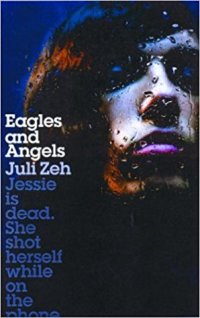As we came into the final week of GLM VII, I noticed that my female:male author ratio, whch I try to keep at 50:50, was woeful. Not through lack of effort on my part, but because the ladies simply weren’t cutting it. Of the 4 German titles longlisted for the Warwick Prize for Women in Translation, I have abandoned 2 and am so underwhelmed by a third that writing about it is an impossibility. This is not what I intended at all. Desperate measures were needed, and so I turned to an old favourite, (Though I’m not so sure I should use the term old in connection with Zeh.)

Eagles and Angels is her 2002 Deutscher Bücherpreis winning debut novel. (This award was the precursor of the Leipzig Book Prize, not the German Book Prize.) It is full of the verve and vim I was missing in the more literary offerings alluded to above, and this kept me reading even though novels with drug addled narrators are not usually my preferred reading material.
Max is traumatised. His girlfriend, Jessie, shot herself in the head while talking to him on the phone and he is not coming to terms with it at all. The solace provided by the lines of coke he snorts diminishes in direct proportion to his increasing intake. One night he decides to phone in to a late night radio show to confess. While he is not directly responsible for Jessie’s death, he confesses to the murder of her previous boyfriend, Shershah. Instead of turning him over to the authorities, the radio host, Clara, tracks bim down. Turns out she is researching for a psychology degree and sees him as an interesting case study.
She convinces him to tell his story, and so a tortured and surprising history unfolds as Max dictates it into one cassette after another. Max hasn’t always been the loser we know him to be. He was once a hot shot lawyer, specialising in the expansion of the EU to the East. He should have known better than to get involved with Jessie, but an early teenage infatuation with the drug runner’s daughter makes it impossible for him to walk away when she comes to him, years later, in her hour of need.
As he makes his confession, more and more unexpected connections are made in Max’s mind. Like the connection between his seemingly stellar career and the opening of drug routes from Yugoslavia to Europe during the Balkan Wars in the early 1990’s. He becomes convinced that Jessie was murdered, and that he is next. Death is something to be welcomed and so he sets off with Clara from Leipzig to Vienna. In his mind it is a journey back to the hornet’s nest, where he is bound to be killed. When the hit squad doesn’t arrive, he (and we) are forced to ask why?
Given that Max, in his drug-addled state, is the most unreliable of narrators, things are more weird in Vienna than I was expecting. He and Clara are squatting in some kind of derelict outhouse – don’t ask me if they’re lying low or wanting to be found, because they send out some very mixed messages. Of course, everything is filtered through Max, so what sense can we expect to get out of a coke-head? The only person with any semblance of common sense is Jacques Chirac, not the politician, but Jessie’s great dane!
The question constantly running through my head was why does Clara put up with this? Because let’s be clear. Max is not good to her. He hits her. Is psychologically cruel. Feeds her coke when she is sick. She must be really struggling for a subject for her Ph.D to continue with this field study. Or does she have other motivations?
Of course, nobody is what they seem and Max is in the midst of a smaller circle than he could ever anticipate. What’s really clever is that there is nobody to sympathise with wholeheartedly. . Not Max. Not Clara. (Even if her psychological manipulations are much to be admired.) Jessie maybe? Only maybe. The great dane? Definitely,
And the victims of the Balkan wars.
Zeh’s plot ingeniously welds a grimy, gritty, private tragedy to the horrendous fate of those caught up in the Balkan conflict of the 1990s. Is it a fictional connection? Probably not – Zeh used to work for the UN and is, therefore, fully aware of the machinations at the heart of European politics. And how that implicates what we – the public – may think of as honourable institutions.
In a rare moment of lucidity, Max surveys the land outside the squat, It’s littered with dog turds (because, of course, he and Clara, cannot be bothered to clean up after Jacques Chirac.) I wonder if that patch of land is symbolic of a greater political landscape.
Hi Lizzy, Zeh is one of my favourites but I never did go back to this one.
Now which are the three books I should be avoiding, if you’re going to take a bullet for the team then spurt out the three names before you turn your toes up
Naughty, naughty. Well, given that I read and reviewed the German language winner of the Warwick Prize (Memoirs of A Polar Bear) and liked it much better 2nd time around, I do wonder whether I should give the books by Larissa Boehning, Zsuszanna Gahse and Herta Müller another shot. (BTW the longlist for the Warwick Prize can be download from https://warwick.ac.uk/fac/cross_fac/womenintranslation/hp-contents/wit_prize_2017_list_of_eligible_titles.docx.)
As for Juli Zeh, she’s brilliant, but now that I’ve read and reviewed all four novels translated into English, I’m debating whether I should take the plunge with Unterleuten in German. But it’s rather long. I’m hoping someone is translating it as I speak …
Of the list, I’ve just finished the Michaud Bondrée in French, Procul Harem and all, enjoyed it